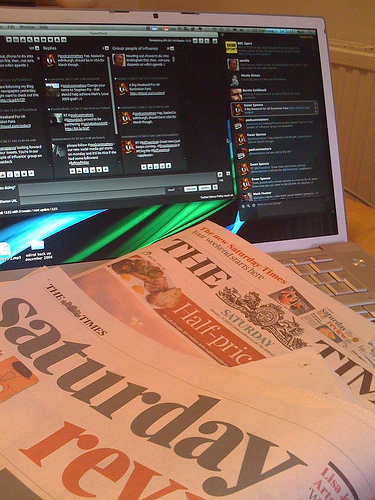When Rob Ford was accused of being drunk and belligerent at a Leafs game and asking a stranger if he wanted his wife to “get raped and shot,” he lied and said he wasn’t even at the game. When he was asked by the Toronto Sun if U.S. police had charged him with possession of marijuana, he lied by forcefully and repeatedly denying it. When the CBC’s This Hour Has 22 Minutes made an admittedly-offside attempt to interview him in his driveway, he lied multiple times, saying it was dark out, his daughter was with him, and that the team from the CBC ran at him yelling “we’ve got you Rob Ford, we got you,” none of which is true according to video evidence.
We have not yet seen video evidence of Ford’s encounter with Toronto Star reporter Daniel Dale (some security footage is apparently being reviewed UPDATE: Doug Ford says the video will not be released), so for now we’re left only with their two very different versions of events. Ford’s long history of dishonesty, combined with the fact that Dale is an award-winning journalist whose very profession is to document and tell the truth, has lead many to conclude with a reasonable amount of confidence that Dale’s version of events—in which the reporter never left public property nor came close to entering the mayor’s backyard when Ford ran at him, shouting with his fist cocked, and forced him to drop his phone and voice recorder—is the more accurate one. (Add to this that Ford appears to corroborate significant pieces of Dale’s account, but does not provide an explanation for why Dale would yell for help and drop his phone if he didn’t fear for his safety.)
The mayor then waited two hours before contacting a friendly media outlet (I use this phrase confidently, since Newstalk 1010 provides him with a weekly show) to claim that he had caught a Toronto Star reporter trespassing on his property and taking photos of his family. (There is no evidence that’s true, and Ford now admits he never saw Dale come closer than “maybe five meters” from his fence.) That delay, meaning that television cameras didn’t arrive until after dark (no doubt everyone watching the evening news pictured Dale lurking in the backyard after sundown, when in fact he was on public land while it was still light out) is seen by some as a deliberate attempt to distort the truth in a way that undermines the credibility of the Star.
Once Dale’s version of events was published to the Star’s website, even those who believed Dale started to criticize and mock him. Suggesting he had no right to be doing his job (reporting on a story that Ford wants to buy a piece of public land he alternatively says is required either to enhance his home’s security or build a larger play area for his children) on public property in daylight is only upstaged in offensiveness by the pack of people, most of them men and many of them journalists, questioning Dale’s manliness for being frightened when physically threatened and robbed by an agitated man twice his size.
Now, on World Press Freedom day, the mayor is threatening a complete media boycott unless Daniel Dale is fired from his job of reporting on city hall.
There is a temptation to lament that this is what we’re talking about instead of “real issues,” including the “real” story that the mayor is trying to buy a piece of a public park to increase the size of his property. But there’s often more than one issue simultaneously worthy of our attention, and the issue of the mayor’s character is significant and increasingly problematic. How can anyone achieve “journalistic balance” and report on the mayor when a history of blatant and intentional deceit is compounded with threats of physical violence (I am not prepared to define a cocked fist as anything else) towards a reporter?
Years ago, when asked why he didn’t tell the truth about being at the Leafs game, Ford said it was because he was “embarrassed.” He should be deeply embarrassed by last night’s events and his reaction to them as well, but it goes beyond that. We elect leaders to represent the best of us. When Rob Ford charged Daniel Dale, he did so as our mayor. We’re all diminished when this is the kind of leadership we have to look to, and we deserve better.
